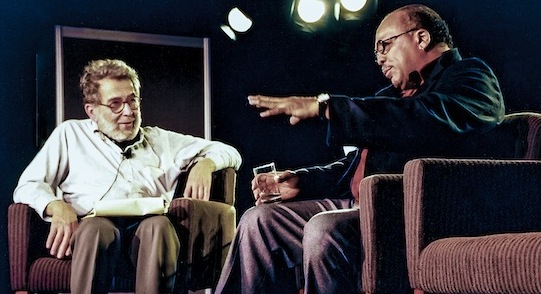Jan 13, 2026 2:09 PM
More Trump-Kennedy Center Cancellations
The fallout from the renaming of the John F. Kennedy Center for the Performing Arts to include President Donald…

Nat Hentoff (1925–2017), seen here interviewing Quincy Jones
(Photo: Michael Jackson)Journalist Nat Hentoff, who wrote extensively on jazz and social issues, died Jan. 7 in his Manhattan home at age 91. Over the course of his career, which lasted more than 60 years, Hentoff contributed to dozens of publications, including DownBeat, The Village Voice, The New York Times, The New Yorker, The Washington Post, New Republic, Esquire and Playboy.
Hentoff worked as DownBeat’s New York-based associate editor from 1953 to 1957, co-edited the periodical Jazz Review from 1958 to 1961 and went on to become a major voice in jazz criticism. Gifted with keen observational skills and known for his passionate convictions, Hentoff helped give rise to what became known in America as “alternative” journalism.
Additionally, he was a champion of civil liberties who frequently wrote about First Amendment rights and worked tirelessly to advance appreciation and knowledge of jazz. In 2004, Hentoff was selected as the first recipient of the A.B. Spellman NEA Jazz Masters Award for Jazz Advocacy.
Born in Boston on June 10, 1925, Hentoff was an avid reader who adopted a rebellious attitude and demonstrated an appetite for debate at a young age. After discovering the early jazz stylings of Artie Shaw and Duke Ellington, he began to embrace the more modern-leaning work of bebop artists such artists as Thelonious Monk and Charlie Parker.
Hentoff graduated from Boston’s Northeastern University in 1946, and after working for a local radio station for several year, he moved to New York in 1953 and been contributing to DownBeat and other publications. He wrote liner notes for countless jazz albums and edited several books on jazz, including Hear Me Talkin’ to Ya: The Story of Jazz by the Men Who Made It (1955, co-edited with Nat Shapiro). His 50-year stint as a columnist for the Village Voice began in 1958.
As A&R director for the Candid label in the early 1960s, Hentoff produced recordings for some of the biggest names in jazz, including Charles Mingus, Cecil Taylor and Abbey Lincoln.
Hentoff wrote several books about music, including The Jazz Life (1961), Jazz Country (1965), Boston Boy: Growing Up with Jazz and Other Rebellious Passions (1986), Listen to the Stories: Nat Hentoff on Jazz and Country Music (1995) and American Music Is (2004). He also wrote novels for young adults, murder mysteries and nonfiction works about free speech, criminal justice, educational issues and the U.S. Constitution.
Hentoff received the National Press Foundation’s lifetime achievement award in 1995. He was the subject of the 2014 film The Pleasures of Being Out of Step, a documentary by journalist David L. Lewis that used the story of Hentoff’s life to explore the themes of liberty, identity and free expression.
In an essay that DownBeat commissioned Hentoff to write (for the 1995 book DownBeat: 60 Years of Jazz), he reflected on his editorial stint at the magazine. Below is an excerpt:
“During those years in the 1950s when I was the New York editor of DownBeat, I spent nearly every night in the clubs and many afternoons at rehearsals. It didn’t seem like a job because jazz at the time was indeed ‘the sound of surprise.’
So it was too in the next decade, but there was unusual ferment in the ’50s. The historic rise of jazz festivals. The rapid diversification of modern jazz—from hard-bop to largely white West Coast jazz. The breaking down of Jim Crow in auditoriums in the South and other places—due to the pioneering insistence of impresario Norman Granz, who was a promoter of civil rights as much as jazz.
Most exciting of all was the unexpected. One night, Oscar Pettiford was leading a combo at Cafe Bohemia in Greenwich Village. A very large young man carrying an alto saxophone—that seemed quite small against his girth—asked to sit in. Nobody knew who he was.
Oscar motioned him to the stand and then set a startlingly fast tempo. He wasn’t going to let this young man even warm up. The saxophonist flew through the tempo with stunning ease, strikingly cohesive ideas, and passion. All of us were exhilarated. Even Oscar was impressed. The young man was Julian ‘Cannonball’ Adderley, a college music teacher from Florida. He was signed to a record contract the next day.”
To read an interview with Hentoff, visit the NEA website. DB

Belá Fleck during an interview with Fredrika Whitfield on CNN.
Jan 13, 2026 2:09 PM
The fallout from the renaming of the John F. Kennedy Center for the Performing Arts to include President Donald…

Peplowski first came to prominence in legacy swing bands, including the final iteration of the Benny Goodman Orchestra, before beginning a solo career in the late 1980s.
Feb 3, 2026 12:10 AM
Ken Peplowski, a clarinetist and tenor saxophonist who straddled the worlds of traditional and modern jazz, died Feb. 2…

The success of Oregon’s first album, 1971’s Music Of Another Present Era, allowed Towner to establish a solo career.
Jan 19, 2026 5:02 PM
Ralph Towner, a guitarist and composer who blended multiple genres, including jazz — and throughout them all remained…

Rico’s Anti-Microbial Instrument Swab
Jan 19, 2026 2:48 PM
With this year’s NAMM Show right around the corner, we can look forward to plenty of new and innovative instruments…

Richie Beirach was particularly renowned for his approach to chromatic harmony, which he used to improvise reharmonizations of originals and standards.
Jan 27, 2026 11:19 AM
Richie Beirach, a pianist and composer who channeled a knowledge of modern classical music into his jazz practice,…